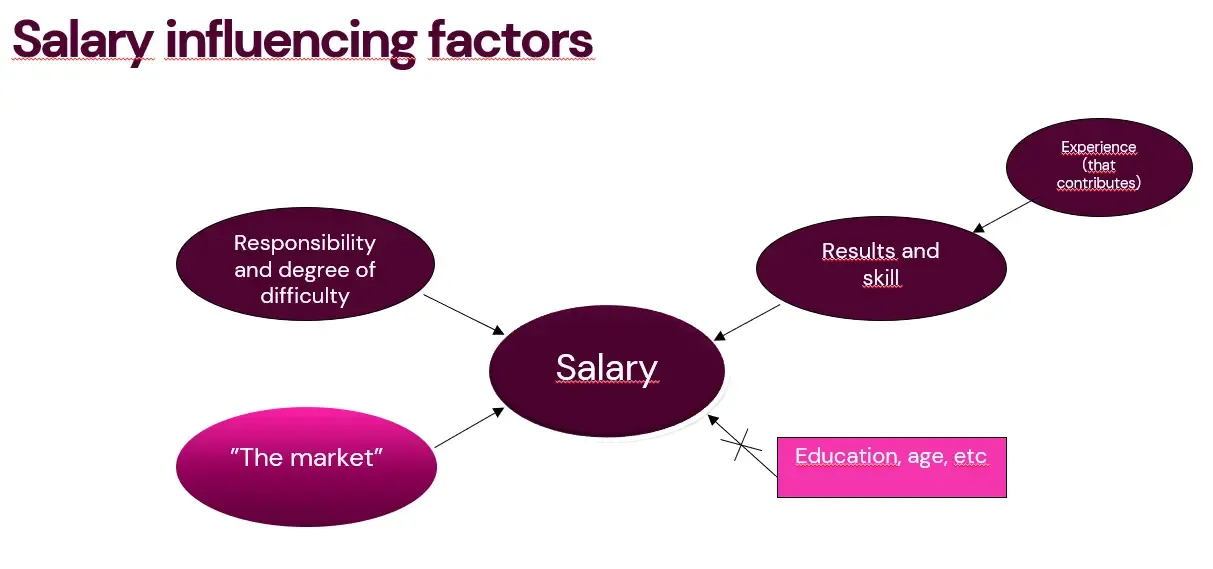Salary setting at KI
The salary is set at employment and revised in the salary review. The Salary setting at KI is based on the central salary collective agreement for state employees (RALS) and KI:s salary policy, Salary as a policy instrument.

The main principle is that salary formation helps KI to reach the goals of the organization. KI is a government agency, and the government agencies as a whole must not set wage standards in the Swedish labor market which means that KI is not totally free to set salaries for our employees. The rate of wage growth must be decided by the competitive sector, mainly the export companies, whose cost development must be adjusted to the outside world. Otherwise, the employment and socioeconomic stability in Sweden is threatened.
Salary setting
The bases of salary setting is performance and skill in relation to business objectives, and responsibilities and severity. Supply and demand on the labor market for various professions may affect the salary as well as significantly change of job assignments according to responsibility and severity. Also experience that contributes positively to your performance can have positive affect on your salary. The thought of salary setting is to award good performances and to keep and be able to recruit employees. In the picture at the top of this page, there is a description over factors that affect the salary setting.
The inflation is not a factor for salary setting and the salaries is not reducing at a low inflation or a minus inflation. KI has a responsibility to equalize and prevent differences in pay and other conditions of employment between women and men who perform work that is considered equal or equivalent. Employees on parental leave are entitled to the same pay progression during their parental leave as they would have had if they had been working instead.
Salary review and result- and salary dialog (earlier performance management dialog 2)
Salary reviews at KI is conducted in line with central collective agreements, for more information see Salary review.
Goal and development dialog (earlier performance managment dialog 1) is usually conducted after the goals of the organization is set in the beginning of the year. In this dialog the manager and the employee discuss goals, expected performance, possible competence development, the focus for this year etc.
Result- and salary dialog
The result- and salary dialog is usually conducted in the fall, always in connection to the salary review and focuses on performance in comparison to the salary criteria and the goals set in the goal- and development dialog.
The purpose of the result- and salary dialog is to get a clearer dialog between the employee and manager on salary setting in connection to the performance during the year. The employee should get a clear idea of how the manager assesses performance and ability. The dialog will focus on the employee's achievement, results and how the assignments were performed. The conversation provides clarity in the reasons for the salary setting and is thus a mandatory task for both employees in their role as employees (medarbetarskap) and managers in their leadership.
The salary setting must reflect the difficulty and responsibility of the work. Other factors as salary situation (löneläge) and need for the competence can be important in salary setting. In the dialog the employees should get an opportunity to account for their work and their efforts during the year. It is important that both the manager and the employee are well prepared before the meeting to achieve a good dialog.
A continuous dialog during the year between the manager and employee is important to achieve a clear connection between goals, assignments, performance and results.
For members in Saco-S and for unorganized members the manager presents a new salary based on KI:s salary criteria in the dialog. The employee accepts the new salary. If the employee is a member in Saco-S the employee can disagree if he or she is not satisfied with the process.
Regarding members of OFR / S, P, O and Seko; the dialog is to be conducted the same way as for other employees. However, the salary is not to be agreed in the dialog. It is set in central negotiations between the employer and the unions.
Preparations before result- and the salary dialog
As an employee it is important that not only your employer prepares for the dialog but also that you prepare yourself. Think about what you have achieved since the goal- and development dialog. Read the wage policy and the salary criteria. Please use the templates that you find in the wage policy.
Both the employer and you as an employee must contribute to a good conversation based on openness and respect, however the employer has a greater responsibility to conduct the dialog in a good way.
Factors of importance for the experience of satisfaction
Some success factors that have proved to be important for a good dialog is that the manager has:
- created a dialog about the tasks, performance and results and given you as an employee a chance to present your point of view
- explained and justified your salary
- explained how you can develop and affect your salary
- if you wish, inform what is required for further salary development
Salary setting for doctoral students
For doctoral students the salaries are set due to the so-called doctoral latter why they should not take part of performance management dialog 2.
Practical issues
For practical issues and questions, HR at your department will inform and help out.
